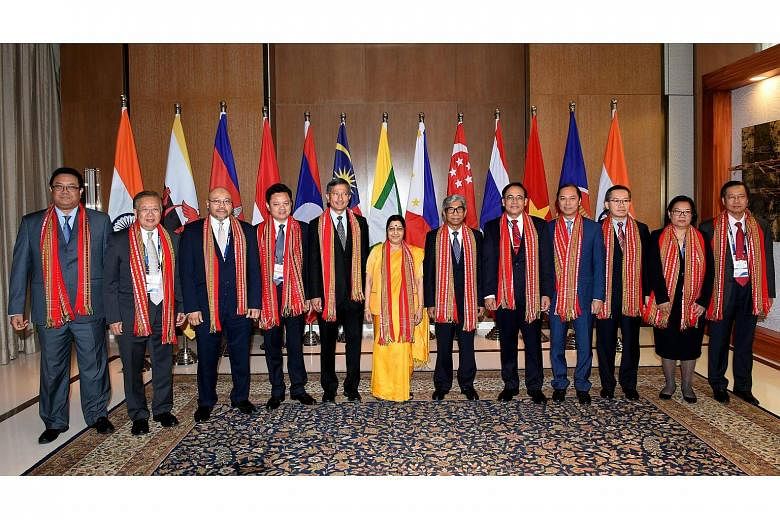NEW DELHI • Maritime cooperation has emerged as a key area of engagement between India and Asean as New Delhi steps up its links with South-east Asia under Prime Minister Narendra Modi's Act East Policy.
At the heart of this so-called "blue economy" lies the Indian government's commitment to enhancing connectivity between its north-eastern region and neighbouring Asean cities.
Ms Preeti Saran, secretary (East) in India's External Affairs Ministry, highlighted the importance New Delhi attaches to Asean-Indian cooperation in the maritime domain in her opening address at the 10th Delhi Dialogue yesterday. The dialogue is an annual gathering of political and business leaders, policymakers and think-tanks to discuss issues related to India and Asean.
At a workshop on the blue economy held on Wednesday ahead of the dialogue, she also pointed out the close maritime ties between the two sides. "Asean and India are maritime neighbours," she said, adding that the blue economy will be a key facilitator for the growth and development of the Indo-Pacific region.
Noting the great potential for cooperation in this area, she said: "Through the efficient harnessing of blue resources, including through the use of new and emerging technologies, the issues of poverty, food insecurity, unemployment and ecological imbalance can be effectively tackled."
The subject of enhancing air, land and sea connectivity was also a key focus of discussions at the Delhi Dialogue as participants noted the importance of these links to the success of cooperation between north-east India and Asean. "Enhancing connectivity is the key to unlocking the prosperity of this region," said Minister of State for External Affairs V. K. Singh in his address at a panel discussion with leaders of north-eastern states.
Singapore Foreign Minister Vivian Balakrishnan said Singapore looked forward to expanding air and digital connectivity between India and Asean countries. He spoke of expanding the India-Myanmar-Thailand highway, currently under construction, right across South-east Asia.
But, he said, Singapore "resolutely opposed" any attempt to constrain the right of freedom of navigation and overflight in the region.
"Singapore is a tiny city state. We have no chance of surviving in a world where might is right. Singapore, therefore... has to be a strong advocate and supporter of a rules-based world order, which upholds the rights and sovereignty of all states equally regardless of size and provides peaceful dispute resolution without resorting to force."
North-east India has been dubbed the "gateway to South-east Asia". But more than just a "gateway", the region should strive to be the "hub of India's Act East Policy", said Mr Ram Madhav, chairman of the India Foundation.
"With its vastness, diverse natural resources and literate, English-speaking population, the region can provide great opportunities with great value," said Mr Madhav, who is also a senior member of the ruling Bharatiya Janata Party.
New Delhi's commitment to the policy - which covers a wider scope of cooperation than the previous Look East Policy and is more result-oriented - is apparent at this year's Delhi Dialogue. It sees the leaders of all eight north-eastern states coming together at various panel discussions at the two-day event.
Besides trade and tourism, participants have also called for greater educational and cultural exchanges, especially the setting up of institutions for South-east Asian studies in collaboration with institutes such as Singapore's ISEAS - Yusof Ishak Institute. There have also been calls for Asean nations to set up consulates in Assam, the fastest-growing state in north-east India.
Additional reporting by Nirmala Ganapathy


